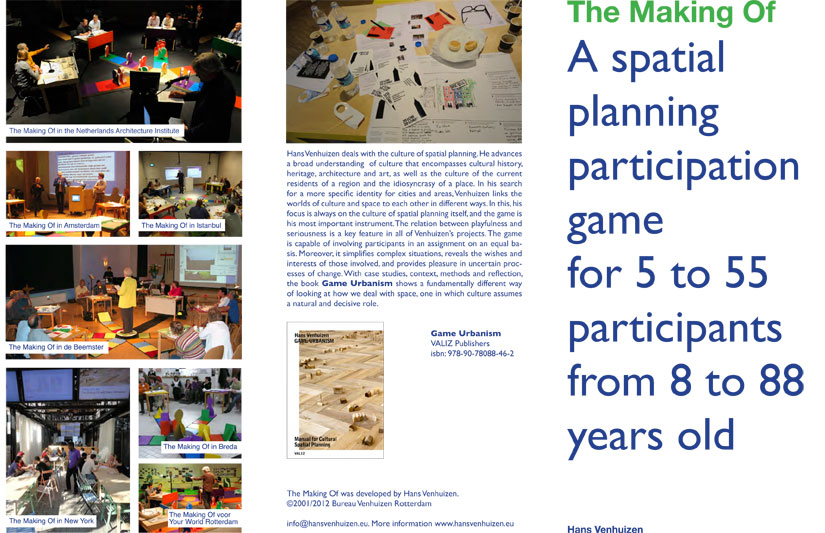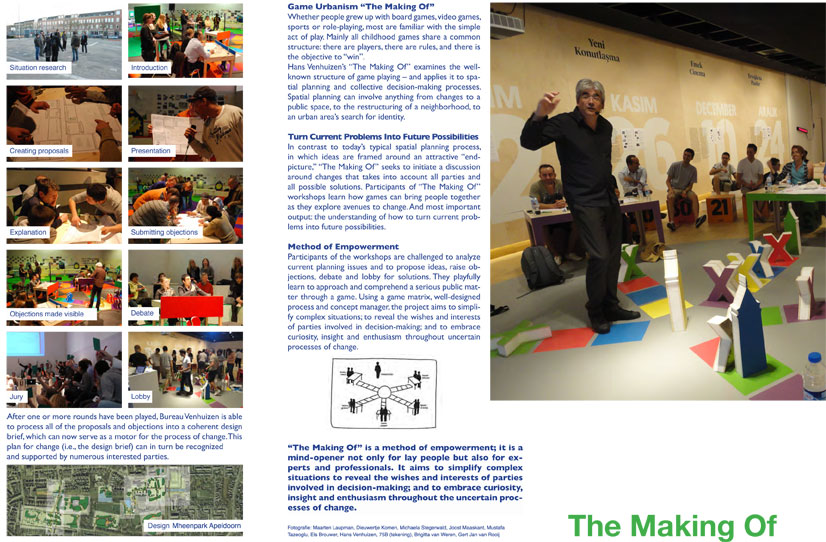Hans Venhuizen deals with the culture of spatial planning. He advances a broad understanding of culture that encompasses cultural history, heritage, architecture and art, as well as the culture of the current residents of a region and the idiosyncrasy of a place. In his search for a more specific identity for cities and areas, Venhuizen links the worlds of culture and space to each other in different ways. In this, his focus is always on the culture of spatial planning itself, and the game is his most important instrument. The relation between playfulness and seriousness is a key feature in all of Venhuizen’s projects. The game is capable of involving participants in an assignment on an equal basis. Moreover, it simplifies complex situations, reveals the wishes and interests of those involved, and provides pleasure in uncertain processes of change. With case studies, context, methods and reflection, the book Game Urbanism shows a fundamentally different way of looking at how we deal with space, one in which culture assumes a natural and decisive role.
Game Urbanism “The Making Of”
Whether people grew up with board games, video games, sports or role-playing, most are familiar with the simple act of play. Mainly all childhood games share a common structure: there are players, there are rules, and there is the objective to “win”.
Hans Venhuizen’s “The Making Of” examines the well-known structure of game playing – and applies it to spatial planning and collective decision-making processes. Spatial planning can involve anything from changes to a public space, to the restructuring of a neighborhood, to an urban area’s search for identity.
Turn Current Problems Into Future Possibilities
In contrast to today’s typical spatial planning process, in which ideas are framed around an attractive “end-picture,” “The Making Of” seeks to initiate a discussion around changes that takes into account all parties and all possible solutions. Participants of “The Making Of” workshops learn how games can bring people together as they explore avenues to change. And most important output: the understanding of how to turn current problems into future possibilities.
Method of Empowerment
Participants of the workshops are challenged to analyze current planning issues and to propose ideas, raise objections, debate and lobby for solutions. They playfully learn to approach and comprehend a serious public matter through a game. Using a game matrix, well-designed process and concept manager, the project aims to simplify complex situations; to reveal the wishes and interests of parties involved in decision-making; and to embrace curiosity, insight and enthusiasm throughout uncertain processes of change.




 Hans Venhuizen onderzoekt de rol van cultuur in de ruimtelijke ordening, ook wel aangeduid met het begrip culturele planologie. Hij richt zich op vestigings- en planningsprocessen in de ruimtelijke ordening en neemt daarbij cultuur als vertrekpunt.
Hans Venhuizen onderzoekt de rol van cultuur in de ruimtelijke ordening, ook wel aangeduid met het begrip culturele planologie. Hij richt zich op vestigings- en planningsprocessen in de ruimtelijke ordening en neemt daarbij cultuur als vertrekpunt.